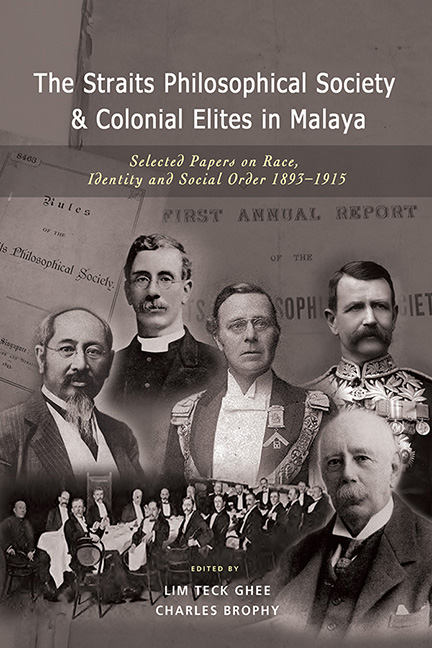 The Straits Philosophical Society and Colonial Elites in Malaya
The Straits Philosophical Society and Colonial Elites in Malaya 3 - The Influence of Europeans Abroad Upon Native Races
Published online by Cambridge University Press: 09 January 2024
Summary
Editors’ Note
W.R. Collyer was a prominent lawyer in the colony who had earlier served in Sierra Leone and the Gold Coast before arriving in Singapore in 1892. His 1898 Presidential Address is notable for expressing a growing scepticism about the liberal aims of empire and its potential for civilizing and reforming colonized societies. In particular, Collyer highlighted a lack of faith in the “universal mission of our race” and the “missionary force and its power of assimilating other races”. For Collyer this was rooted in the reality of racial difference. Racial characteristics determined for him the “natural receptivity” of races to different cultures, and whilst the British had been able to spread European ideas to non-European societies, this spread remained limited. Drawing on the British experience in India where the Bramo-Samaj had emerged as a comparable culture to the English, Collyer noted that this had not passed down to the masses and therefore highlighted the unsuitability of Indians for self-government. Yet if liberal reform had failed, he did not believe that this should entail a wholesale abandonment of the civilizing mission. For him, emphasis should move from impressing the “natives with trumpets and drums and gunpowder” or hastening “to get rich with fraudulent goods and short measures” to a gradual process of persuasion and honest and considerate dealings with colonial peoples. This he saw as the more important mission for empire builders.
The subject I have chosen for my address tonight is “The Influence of Europeans Abroad upon Native Races”. It is a subject which must frequently suggest itself to all thinking Europeans in a place like this, and may, I think, be considered to a certain extent appropriate in a meeting of Western philosophers in an Eastern city, where, if anywhere, that influence should be exemplified in all its present features, and its strength and weakness, its success and failures, should be manifest to the ordinary observer. The ordinary observer, however, is apt to be very much taken in.
- Type
- Chapter
- Information
- The Straits Philosophical Society and Colonial Elites in MalayaSelected Papers on Race, Identity and Social Order 1893-1915, pp. 58 - 70Publisher: ISEAS–Yusof Ishak InstitutePrint publication year: 2023


